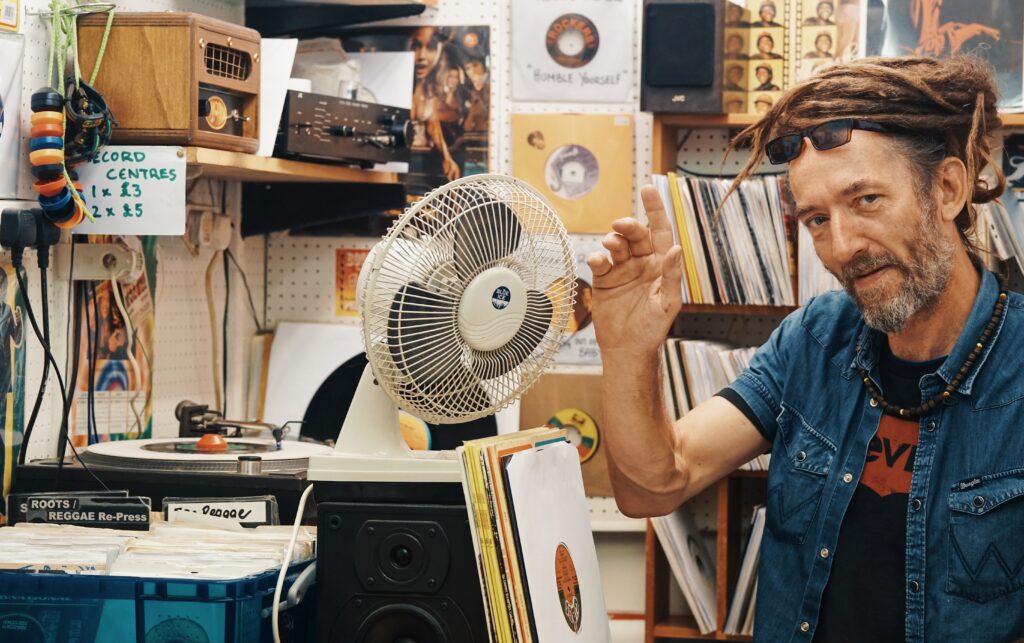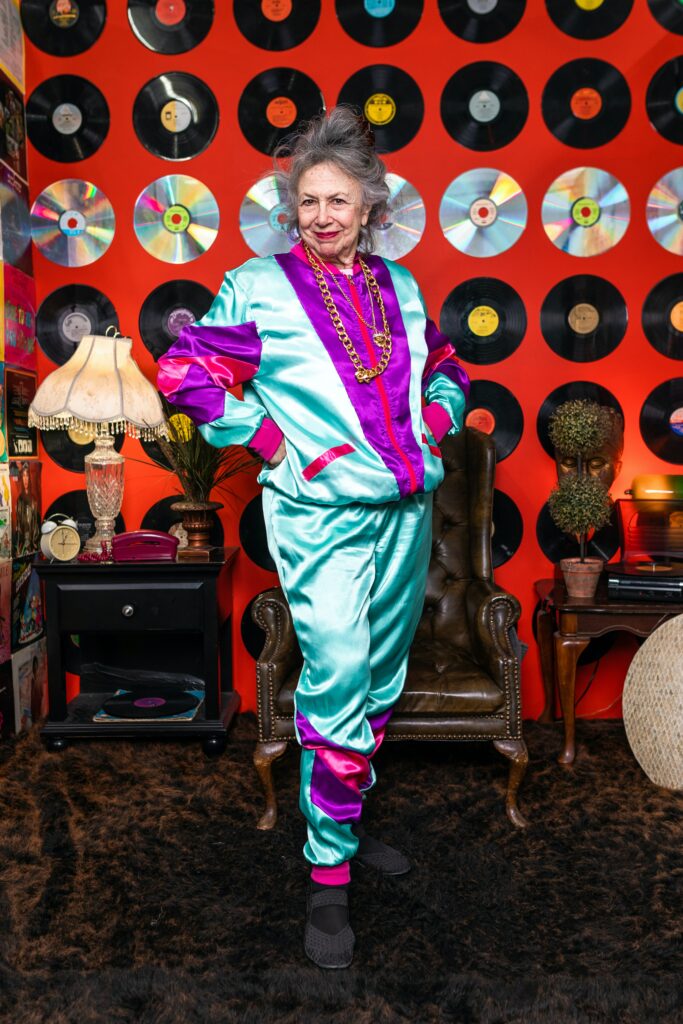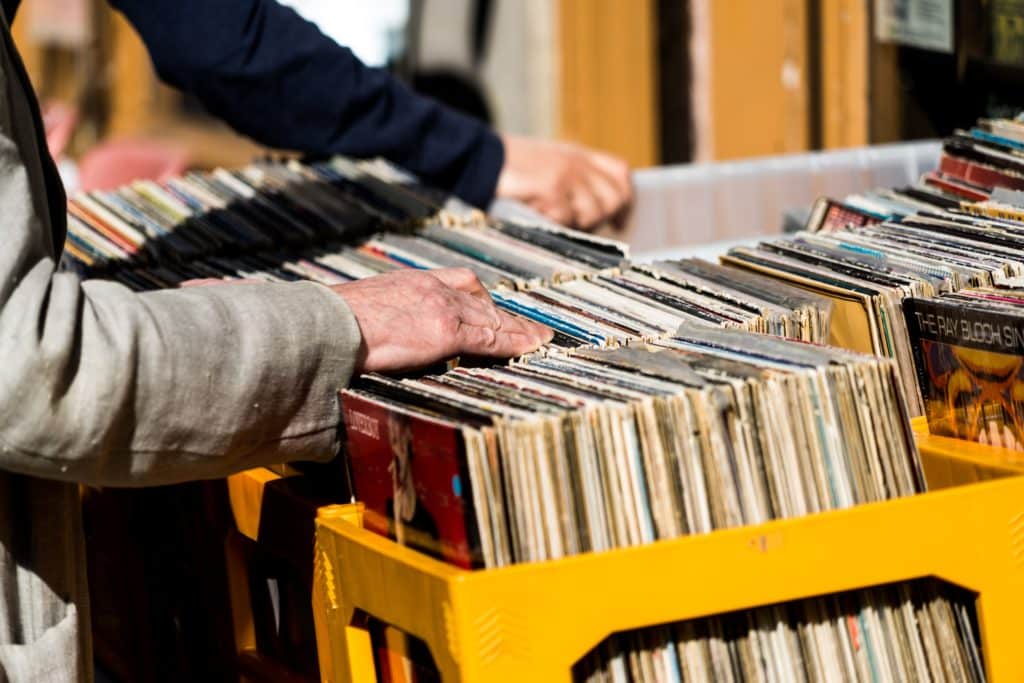Older consumers going gaga
By David Sinclair •
Music lover, and director of the international longevity centre shares his views on ageism in the music industry; why older consumers are going gaga for record store day, and why we should be listening to more Metallica.

It’s a quarter of a century since High Fidelity by Nick Hornby was published. The bestselling book which was later turned into a film told the story of record shop owner Rob Flemming, a 35 year old man getting through a pre mid-life crisis by writing lots of top-five lists.
Rob didn’t go as far as me by dyeing his hair green. But then again he didn’t have COVID to put up with.
So while reflecting on my own mid-life crisis, 14 year old George Sinclair and I last weekend experienced our first Record Store Day. An overnight stay in Brighton and a 5.30am wake-up call got us in the (already 70 deep) queue for Resident Music just after 6am.
I hadn’t really thought about the demographics of record collectors. But wow. George was probably the youngest in the queue. Who knew so many men in their 50s were willing to camp overnight outside a shop? What has happened to all the women?
I shouldn’t have been surprised at the power of the 50+ consumer though. ILC research has shown that 50+ households are already responsible for more than half of consumer spending. Yet these consumers remain too often invisible to industries seemingly seeking out youth.
And older consumers don’t just buy for themselves. In presentations I sometimes quote industry statistics which suggest that older people are responsible for buying a significant proportion of sweets and toys. There is a lot of PR spin in the evidence but it’s likely this is also true for records (which aren’t cheap). I did treat myself to a copy of Chromatica, but many of the 40 and 50 somethings in the queue buying Ariana and Lady Gaga may well have been planning on gifting. [Yes there probably were a few scalpers in the queue but only a tiny proportion of the records sold on Saturday have found it onto eBay or Discogs].
This isn’t the first time the industry has sought to deny ageing. I wrote 10 years ago about how festivals were getting older and how the industry wasn’t happy — David Sinclair

The industry remains embarrassed about age
It seems however that the industry remains a little embarrassed by the age of its customers with organisers of Record Store Day again trying to make the not particularly evidence based claim that “record collectors are getting younger“.
Some younger people themselves are equally shy about their hobby. A question posted on Reddit asked young record collectors “Do any of you lads & lasses keep your collection a secret so you avoid any flak from others outside the hobby?”
The reality though is that it’s still the case that “middle-aged men – not millennials – are fueling the record renaissance”.
This isn’t the first time the industry has sought to deny ageing. I wrote 10 years ago about how festivals were getting older and how the industry wasn’t happy.
“In 1997, Festival organiser, Michael Eavis expressed concern about the lack of younger people coming to the festival. He said that they were, “trying to get the youngsters back – the 16, 17 and 18 year olds. We’re attracting a lot more people in their 30s and 40s and need to get the Radio 1 and NME crowd back in”. He went on to note that the 30 and 40 year olds change the character of the event: “The demographic is changing and it’s slightly worrying. We might lose the fascination the show has for the public”.”
The Manic Street Preachers attracted 25000 complaints about a song on Top Of The Pops in 1994; found one of their record covers banned by supermarkets in 2005; and at one point called for a bypass to be built over Worthy Farm. So hardly a conservative band devoid of controversy. Yet at a pre-covid gig I heard one person (unfairly perhaps) describe the crowd as looking more like Parent Teacher Association meeting than a rock concert.
James Hetfield of Metallica is 57 years old. They remain one of the biggest selling bands in the world. Yet the twenty-year-old fans they made when they started playing together in 1981 would be 60 today.
And as their audience has aged, even some of the heaviest bands have even started finding seating tickets increasingly popular.

Yet (age) diversity drove the success of Record Store Day
The success of Record Store Day (the majority of vinyl sold out on the day) was driven by the diversity of acts selling new content and targeting different fan bases and all ages.
The hottest selling records of the day were by the (relatively) younger Lady Gaga, Ariana Grande and Haim, all of which are already attracting three to four times RRP on resale sites.
Billy Nomates. Roisin Murphy, and Perfume Genius published new records for the discerning BBC 6 Music listener. 90s indie and rock stars (Republica, Elastica, Bluetones, Therapy, Primal Scream) sought out those of us in our 40s who fondly remember Britpop and indie rock.
Acts like Elton John, U2, Rolling Stones, Kinks, and The Who targeted mainstream (older?) collectors and fans who sought out a long term investment.
There was even space for the real geeky collector, young or old. The weird and wonderful Anita by The First International Sex Opera Band was arguably one of the rarest (and some might say the worst) releases.
Initially only sold through sex shops in Amsterdam the individually numbered LP sold out on the day. Equally unusual, a Beatles Reggae juxtaposition album reminded me of the time I convinced Lily Parsey to attend a heavy metal mariachi band concert when we were in Austin at a conference.
This isn’t the first time the industry has sought to deny ageing. I wrote 10 years ago about how festivals were getting older and how the industry wasn’t happy — David Sinclair
Music has a sexism problem
So yes while the industry might pretend it doesn’t have or want older consumers, the reality is that it does seem to be adapting its offer for an ageing world.
Music continues to have a gender problem though. Eight in ten of the top ten slots at 14 major festivals in 2018 were “all male” acts. This year the picture isn’t much different. Yet 60% of the audience of festivals is female.
Yes, Ariana Grande, Dua Lipa and Billy Eilish show it’s possible to make it big as a young woman but the industry failure to find and support more younger acts like Billy Nomates points to a big problem with sexism.
The relationship between sexism and ageism shouldn’t be underplayed. With even acts like Madonna complaining about this issue, it is likely that ageism plays a major part in the invisibility of older women in the industry. And don’t forget it’s an industry that puts people aged over 25 into the “older” category on X Factor.
That we have both 19 year old Billy Eilish and 73 year old Brian May filling the 02 arena in London next year has to be good news for age diversity. But the industry has an ageism and sexism problem — David Sinclair
What happens next?
That we have both 19 year old Billy Eilish and 73 year old Brian May filling the 02 Arena in London next year has to be good news for age diversity. But the industry has an ageism and sexism problem. Perhaps it’s time for male acts to boycott events and labels with few female performers in the same way many male conference speakers avoid ‘manels’.
And while Record Store Day recognised the diversity of interests of consumers of all ages, the industry is still missing some opportunities.
Certainly the early driver of music streaming was younger people. That may be changing and the industry is likely to need to adapt (not least in ensuring platforms are usable and accessible in design).
ILC’s work on music and dementia highlighted that our love of music doesn’t die as we age. But there is some evidence we listen to less music from our 60s, a factor perhaps partly driven by the fact that much music is listened to on car radios and while travelling to work.
There is therefore a market opportunity for the industry to think about how it can ensure it doesn’t lose us as customers as we get into our 60s and 70s and beyond. We should all challenge our older and younger friends to try new things. I once found myself on BBC Breakfast arguing that older people should listen to more Metallica and One Direction. And I’m glad that George introduced me to the 100 Gecs. Music has never been stranger nor more fun and exciting. I bought the First International Sex Opera Band LP. Just don’t make me listen to it.
More Information
David Sinclair is the Director of the International Longevity Centre (ILC), the UK’s specialist think tank on the impact of longevity on society, and what happens next.
davidsinclair@ilcuk.org.uk
Twitter handle @sinclairda
We want to hear from you
This story has been categorised as:
Leisure & Entertainment